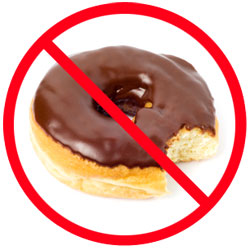Protect Your Heart: Don’t Skip Breakfast
By Dr. James Palermo // July 27, 2013
BREAKFAST MOST IMPORTANT MEAL OF THE DAY
ABOVE VIDEO: Susan Bowerman, registered dietician and nutrition consultant to Herbalife, outlines four very important reasons why you should always eat breakfast, and provides healthy eating advice on what constitutes a “good” breakfast. (Video by HerbalifeIntl)
Remember your mother saying, “Eat a good breakfast. It’s the most important meal of the day?” It’s true. In fact, a number of studies show evidence that people who successfully maintain a significant weight loss eat breakfast just about every day, and a “good” breakfast may help control Americans’ increasing problem with overweight and obesity.
Now new research suggests that it’s time to take a radical look at the importance of the morning meal, not just for weight control, but also as a determinant in the risk for heart disease.
SKIPPING BREAKFAST INCREASES RISK FOR HEART DISEASE
According to a study recently published in Circulation, breakfast really is the most important meal of the day. The research out of Harvard University found that men who regularly skip the morning meal are 27% more likely to have a heart attack or die from heart disease than men who do not.

Researchers in 1992 surveyed nearly 27,000 male healthcare professionals over age 44 about their eating habits and found that about 13% regularly skipped breakfast. Over the next 16 years, 1,527 of the men suffered from fatal or non-fatal heart attacks, including 171 men who did not eat breakfast.
Earlier studies have evaluated the link between skipping breakfast and developing specific heart disease risk factors, such as obesity, diabetes, and hypertension, but this is the first to look at the long-term risk of heart attack.
BREAKFAST KEY TO FAVORABLE DAILY CALORIC METABOLISM
Researchers suggested that without the metabolic effects of breakfast, individuals are more likely to be hungrier later in the day and eat larger meals. Such diets force the body to process a larger amount of calories in a shorter amount of time, which can lead to a spike in blood sugar and clogged arteries. Also, breakfast skippers were more likely to eat later at night, which, compared with men who did not eat late at night, resulted in a 55% higher coronary heart disease rate.
 After fasting all night, breakfast kick-starts your energy level by increasing the body’s metabolic (calorie-burning) rate, and what you choose to eat for breakfast makes a big difference for your health. Unlike lunch and dinner, it is very common to eat the same breakfast every day. We tend to eat pastries, sugar-coated cereal or eggs, but in a society where obesity is rampant, it makes sense to reexamine our eating habits and make changes.
After fasting all night, breakfast kick-starts your energy level by increasing the body’s metabolic (calorie-burning) rate, and what you choose to eat for breakfast makes a big difference for your health. Unlike lunch and dinner, it is very common to eat the same breakfast every day. We tend to eat pastries, sugar-coated cereal or eggs, but in a society where obesity is rampant, it makes sense to reexamine our eating habits and make changes.
SPURN THOSE DONUTS AND FRUIT LOOPS
Healthful, slow-burning foods, like whole grains and fruits, are optimal to control your appetite until midday. A variety of fruits or an occasional omelet with a medley of vegetables can come close to providing the recommended minimum number of five daily fruit and vegetable servings.

Any breakfast is better than no breakfast, but eating a “good” breakfast free of foods heavy with refined sugars, like pastries and sugary cereals which are high in calories but low in essential nutrients, ensures more energy throughout the morning, more balanced hunger throughout the day, easier weight control and, as shown by the Harvard study, results in lower risk of having a heart attack or dying from heart disease.











